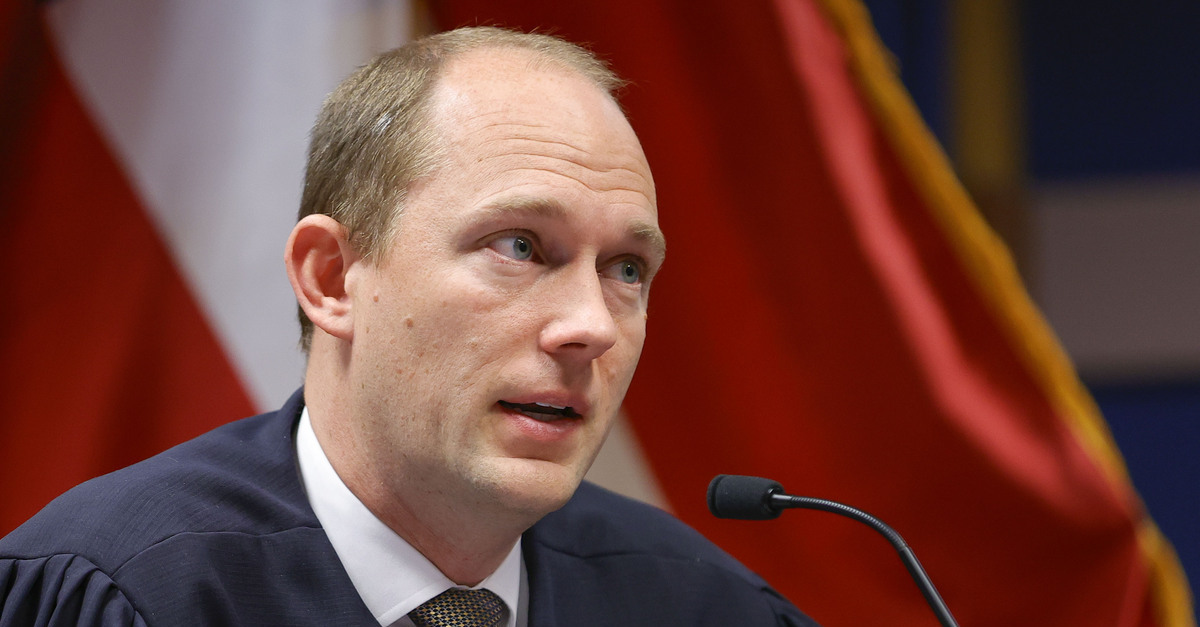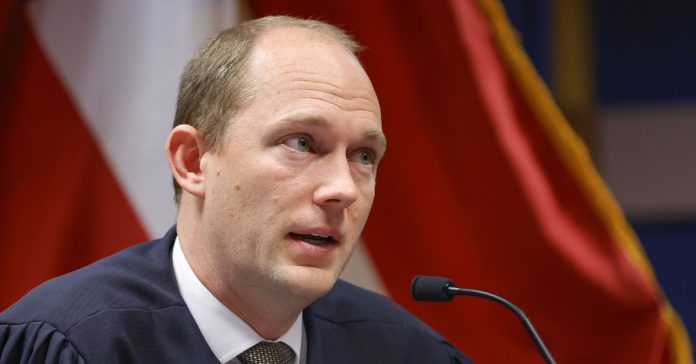
Fulton County Superior Judge Scott McAfee presides over a hearing is to determine whether Fulton County District Attorney Fani Willis should be removed from the case because of a relationship with Nathan Wade, special prosecutor she hired in the election interference case against former President Donald Trump, Friday, March, 1, 2024, in Atlanta. (AP Photo/Alex Slitz, Pool, File)
The judge overseeing the racketeering (RICO) and election subversion case against Donald Trump and others stopped just short of disqualifying Fulton County District Attorney Fani Willis on Friday morning. But the court order directing Willis to get rid of prosecutor Nathan Wade — or for her office to step aside entirely — contained multiple, telling rebukes of the state’s conduct in the case so far.
Those criticisms largely came by way of factual findings which are likely to offer a road map for the defense as they consider whether and how to pursue disqualification and dismissal efforts on appeal.
The factual record established by the court paints a picture of prosecutors who appear to have lied under oath.
1. The finances and the excuses did not look good
In the section of his order detailing how Willis and Wade spent money on — and reimbursed each other for — travel, lodging, and meals, Fulton County Superior Court Judge Scott McAfee says the district attorney “may well have received a net benefit of several hundred dollars.”
In the end, however, the evidence presented by the defense did not show Willis obtained “a material financial benefit as a result of her decision to hire” Wade — or that the “financial gain flowing from her relationship” motivated Willis to prosecute and prolong the case.
Still, the court did not like the financial arrangement — or the way the state defended itself when pressed on the disputed spending.
“This finding is by no means an indication that the Court condones this tremendous lapse in judgment or the unprofessional manner of the District Attorney’s testimony during the evidentiary hearing,” McAfee wrote. “Rather, it is the undersigned’s opinion that Georgia law does not permit the finding of an actual conflict for simply making bad choices — even repeatedly.”
2. The judge did not really buy what the state was selling
In motions and during the hearing, much hay was made about when the relationship between Willis and Wade became romantic.
Ultimately, that determination did not loom large in McAfee’s analysis.
“[N]either side was able to conclusively establish by a preponderance of the evidence when the relationship evolved into a romantic one,” the order reads. “However, an odor of mendacity remains.”
The judge says the mere fact of Willis and Wade dating while public funds — and the public’s confidence in the legal system — sloshed around between them did not inure to the state’s benefit here.
“Even if the romantic relationship began after SADA Wade’s initial contract in November 2021, the District Attorney chose to continue supervising and paying Wade while maintaining such a relationship,” McAfee wrote. “She further allowed the regular and loose exchange of money between them without any exact or verifiable measure of reconciliation. This lack of a confirmed financial split creates the possibility and appearance that the District Attorney benefited — albeit non-materially — from a contract whose award lay solely within her purview and policing.”
On top of that, Wade was, himself, not a credible witness when he tried to explain why he lied in some of his divorce papers.
“Wade’s patently unpersuasive explanation for the inaccurate interrogatories he submitted in his pending divorce indicates a willingness on his part to wrongly conceal his relationship with the District Attorney,” McAfee writes. “As the case moves forward, reasonable members of the public could easily be left to wonder whether the financial exchanges have continued resulting in some form of benefit to the District Attorney, or even whether the romantic relationship has resumed.”
3. Accusing the defendants of racism is not a good look
In motions, Trump’s lead attorney in Atlanta, Steve Sadow, leveled “forensic misconduct” allegations against Willis over her Martin Luther King Jr. Day speech at Big Bethel A.M.E. Church in Atlanta.
The defense accused the district attorney of using the nationally-televised speech to make “inflammatory extrajudicial racial comments” about the defendants and of improperly stoking “racial animus” to influence would-be jurors in retaliation for, and in order to deflect from, the allegations raised in the motion to disqualify.
While declining to reach the same legal conclusion about tainting the jury pool, the court agreed with Trump’s attorney on the facts.
“[I]nstead of attributing the criticism to a criminal accused’s general aversion to being convicted and facing a prison sentence, the District Attorney ascribed the effort as motivated by ‘playing the race card,”” McAfee wrote. “She went on to frequently refer to SADA Wade as the ‘black man’ while her other unchallenged SADAs were labeled ‘one white woman’ and ‘one white man.’ The effect of this speech was to cast racial aspersions at an indicted Defendant’s decision to file this pretrial motion.”
With these findings from the judge, the factual record now shows that Willis strongly implied that at least one of the co-defendants in the case is racist.
4. The state will likely be subject to a gag order — and other potentially bad news for prosecutors
Remarking on the church speech, McAfee says his hands are tied by limited precedent in Georgia law on how to deal with a prosecutor who makes public statements that could prejudice a defendant — while admitting it was not an easy call to make.
So, he offers the idea of the defense filing a relevant motion to keep Willis from saying anything else publicly at all about the case.
“But it was still legally improper,” the court’s order reads. “Providing this type of public comment creates dangerous waters for the District Attorney to wade further into. The time may well have arrived for an order preventing the State from mentioning the case in any public forum to prevent prejudicial pretrial publicity, but that is not the motion presently before the Court.”
Additionally, the judge instructed either Willis or Wade to leave the case. If the district attorney steps aside, she’ll have to go “along with the whole of her office,” according to the court’s order. But there might be more trouble yet to come due to Willis’ actions in the present matter and beyond.
In the same section of the order where the district attorney is chided for her “tremendous lapse in judgment” overall and for later acting in an “unprofessional manner” during the evidentiary hearing, the court foresees ethics issues on the horizon for Willis.
“Other forums or sources of authority such as the General Assembly, the Georgia State Ethics Commission, the State Bar of Georgia, the Fulton County Board of Commissioners, or the voters of Fulton County may offer feedback on any unanswered questions that linger,” McAfee writes.
Willis’ continued presence on the case could spell trouble later on.
McAfee separately takes stock of “the District Attorney’s unorthodox decision to make on-the-record comments, and authorize members of her staff to do likewise, to authors intent on publishing a book about the special grand jury’s investigation during the pendency of this case.” While not rising to any cognizable misconduct for the purposes of the disqualification motion, the judge says: “Such decisions may have ancillary prejudicial effects yet to be realized.”
5. Some additional stings for the state
Before the hearing on the disqualification motion began, the state moved to have co-defendant Michael Roman’s lead attorney Ashleigh Merchant sanctioned for her behavior in the case.
The court implicitly rejected the state’s argument.
“A prima facie argument arises of financial enrichment and improper motivations which inevitably and unsurprisingly invites a motion such as this,” McAfee’s order reads.
In a section remarking on the reliability of witness testimony during the hearing, the court also said Willis’ and Wade’s testimony failed to put “concerns to rest” about the district attorney’s judgment.
“The Court is not under an obligation to ferret out every instance of potential dishonesty from each witness or defendant ever presented in open court,” McAfee wrote. “Such an expectation would mean an end to the efficient disposition of criminal and civil proceedings. Yet reasonable questions about whether the District Attorney and her hand-selected lead SADA testified untruthfully about the timing of their relationship further underpin the finding of an appearance of impropriety and the need to make proportional efforts to cure it.”
The severity of the court’s rebukes have widely been interpreted as evidence of a judge frustrated with prosecutors’ bad behavior — but not quite convinced the defendants met their burden to show why it mattered.
“The order strongly, strongly implies that Wade and Willis lied under oath,” Georgia criminal defense attorney and legal expert Andrew Fleischman mused on X (formerly Twitter) in response to allegations that the judge somehow treated the state with kid gloves.
Former federal prosecutor Renato Mariotti agreed, also on X, writing that McAfee “clearly believes Willis and Wade were not truthful under oath.”
Have a tip we should know? [email protected]

